Iran denies involvement in UK-linked plots after MI5 warning

Iran has denied involvement in what Britain’s domestic intelligence service described as Iran-linked plots on UK soil, saying the accusations are unfounded and damage diplomatic relations.

Iran has denied involvement in what Britain’s domestic intelligence service described as Iran-linked plots on UK soil, saying the accusations are unfounded and damage diplomatic relations.
MI5 Director-General Ken McCallum said on Thursday that British security agencies had disrupted more than 20 operations linked to Tehran in the past year and were stepping up efforts to counter what he called attempts by Iran to silence its opponents abroad. He said 2025 had required “a significant expansion of our counter-Iran effort,” citing what he described as a rise in hostile state activity.
The Iranian Embassy in London said on Friday it “strongly rejects” the statements, adding that Iran “denies any involvement in violent acts, kidnappings, or harassment of individuals in the UK or elsewhere.” It said the accusations were made without credible evidence and were “part of a continued effort to distort Iran’s policies and undermine bilateral diplomatic relations.”
The embassy said Iran “remains committed to international law, sovereign equality, and peaceful coexistence” and urged the British government to “refrain from escalating baseless accusations” and instead engage in “constructive dialogue based on mutual respect.”
British officials have said in recent months that Iran’s activities pose one of the most serious state-based threats to the UK, alongside those from Russia and China. The government has cited cyberattacks, surveillance, and the use of criminal networks to target dissidents as areas of concern.
McCallum’s comments followed a July parliamentary report that described Iran as a persistent and growing security challenge. The report said the UK and its allies faced what it called “a sustained campaign of intimidation and aggression” from Tehran.
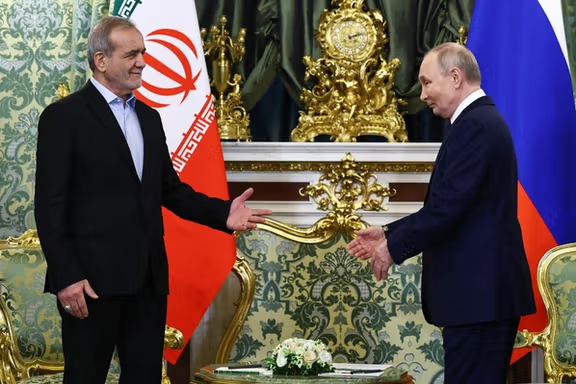
A fresh debate has erupted in Tehran over Russia’s role in Iran’s foreign policy amid diplomatic moves that may suggest an intermediary role for President Vladimir Putin between the Islamic Republic and its arch-foes Israel and the United States.
Russia said on Friday it was ready to help resolve the impasse over Iran’s nuclear program—a day after former foreign minister Mohammad Javad Zarif accused Moscow of standing in the way of Tehran’s potential path to normalcy with the West.
Zarif reignited long-running suspicions about Moscow’s intentions as Iran’s security chief Ali Larijani visited the Russian capital to deliver a message from Supreme Leader Ali Khamenei.
The former head of parliament’s National Security Committee Heshmatollah Falahatpisheh echoed the charge on Friday, asserting that Russia had previously obstructed a potential agreement with the United States in 2021.
“Over-reliance on the Kremlin puts Iran on a dangerous path,” he warned in the economic daily Donya-ye Eghtesad. “Russia is not a trustworthy partner around the world, and ignoring this could be costly.”
Another moderate outlet, Rouydad24, argued in a Friday editorial that “historical experience shows Moscow’s interests do not always align with Tehran’s.”
Lifeline or liability?
Iran’s dependence on Russia—even amid Putin’s hints at goodwill mediation—has long been questioned by moderates who favor a tilt toward the West.
Those calls have intensified since the June war with Israel, when Moscow offered little help—either unwilling, as some in Tehran suggested, or unable due to its own entanglement in Ukraine.
Hardliners, and most crucially the Supreme Leader, appear to think otherwise.
Ali Khamenei has rarely been seen since Israel demonstrated its ability to strike top commanders in June, but the message from those considered closest to him remains unmistakably combative.
Khamenei’s top foreign-policy adviser Kamal Kharrazi said in an interview with the leader’s website that Iran’s missile program and support for armed allies in the region remain non-negotiable.
While emphasizing Iran’s openness to diplomacy, Kharrazi also laid bare Tehran’s limited room for compromise with Washington.
Anti-West line rules
That same day, cleric Alireza Panahian, close to Khamenei’s office, promoted a state-sponsored book advocating Israel’s annihilation—underscoring how deeply confrontation remains embedded in the system’s worldview.
Covering Larijani’s trip to Moscow, hardline outlets invariably hailed him as a “trusted figure,” implying that others, including President Masoud Pezeshkian, were not considered reliable enough to represent Khamenei.
It didn’t help the relatively moderate president that he was filmed cycling through Isfahan as part of a campaign promoting healthy living just as the veteran conservative Larijani delivered Khamenei’s message to Putin.
The image was mocked by social media users who saw it emblematic of a fragmented government in which real authority rests beyond the president's station.
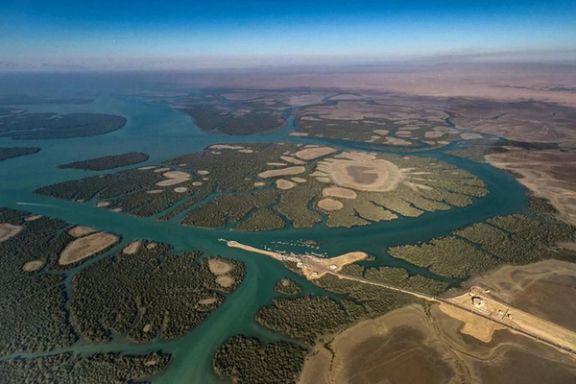
The United Nations World Tourism Organization on Friday named three villages in Iran among the world’s 52 best tourism villages for 2025, citing their rich cultural heritage and historical significance.
The three villages are Shafiabad in Kerman Province, Kandolus in Mazandaran Province and Soheili on Qeshm Island. Together, they represent Iran’s northern forests, central deserts and southern coasts.
Shafiabad, located on the edge of the Lut Desert, is known for its Qajar-era caravanserai and the surrounding sand dunes and “kaluts,” the wind-shaped desert formations that draw travelers and photographers from around the world.

Kandolus, in the green slopes of the Alborz Mountains, is famous for its traditional stone houses, handicrafts, and hiking trails through the Hyrcanian forests. With thousands of years of history, it is one of northern Iran’s oldest rural settlements and a model for cultural tourism.

Soheili, a coastal village on Qeshm Island, has become a leader in eco-tourism and community-based conservation, according to the Iranian Tourism Organization.
Villagers help protect the Hara Mangrove Forests, promote quiet and clean boating, and welcome visitors with local seafood, crafts, and star-filled night skies.

UN Tourism’s “Best Tourism Villages” program honors rural destinations that protect their natural environment, celebrate local traditions, and create opportunities for local communities.
“Our Best Tourism Villages 2025 highlight communities that are working to safeguard their cultural heritage, preserve their natural resources and create economic opportunities through tourism,” UN Tourism Secretary General Zurab Pololikashvili said in a statement.
In total, 52 villages from Africa, the Americas, Asia, Europe and the Middle East received the recognition, selected from over 270 applications from 65 UN Tourism Member States.
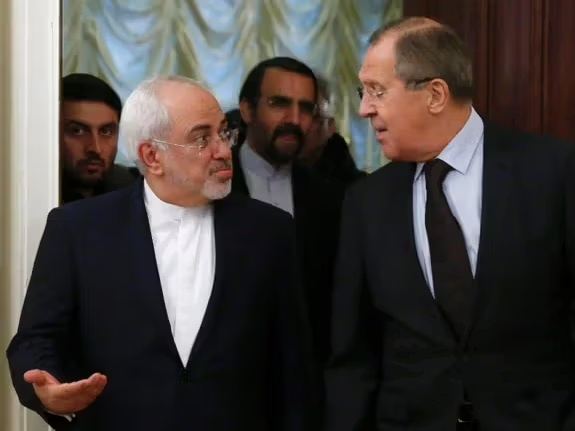
While relations between Moscow and Tehran have generally been good, ties between former Iranian Foreign Minister Mohammad Javad Zarif and the seemingly perpetual Russian Foreign Minister Sergei Lavrov are decidedly not.
Lavrov has often claimed that Russia “always supported” and helped bring about the 2015 Iranian nuclear accord formally known as the Joint Comprehensive Plan of Action, or JCPOA. Zarif, however, has argued that Moscow actually tried to prevent it from being finalized.
Back in 2015, I also believed that Moscow was trying to derail the JCPOA.
Zarif recently told a conference in Tehran that Russia did not want Iran to have normal relations with the rest of the world, yet did not wish for Iran to enter direct confrontation with other states either.
In my view, Zarif’s accusation rings true.
Russia's way
Before Putin’s 2022 invasion of Ukraine froze my ability to meet Russian colleagues, I regularly spoke with Russian scholars who were candid about their view of the Iranian-American relationship.
Several indicated that, from their perspective, the worst-case scenario for Russia was not an Iranian nuclear weapon, but an Iranian-American rapprochement. They feared that if such a rapprochement occurred, Tehran would have far less need for Moscow and might even work with Washington against Russian interests.
From their point of view, it was clearly in Russia’s interests for Iranian-American relations to remain hostile.
As for Zarif’s charge that Moscow prefers Iran not to have normal relations but also avoids direct confrontations: this reflects Russia’s standard diplomatic approach. Moscow benefits when countries are at odds, since it can then provide security assistance to one side—or even both.
When adversaries make peace, they tend to focus on economic development and cooperation with the US, Europe or China—but rarely with Russia.
While Moscow profits from tension, it usually does not want outright conflict, as that can expose its unwillingness or inability to support its “allies”—as seen during the recent 12-day war between Israel and Iran.
Despite Iran having sold armed drones and reportedly even ballistic missiles to Russia for use in Ukraine, Moscow did virtually nothing to help Tehran during that conflict.
This could have led to a rupture in relations, but ongoing hostility between Iran and the US has kept Tehran tied to its one-sided cooperation with Moscow.
Tehran’s choice
Still, Russia cannot be blamed entirely.
One striking feature of today’s “multipolar” order is how many states in the “Global South” manage to cooperate simultaneously with both the West and with Russia and China. In the Middle East, countries like Turkey, Saudi Arabia, the United Arab Emirates, Qatar and even Israel maintain such balanced relations.
Washington may be uneasy with this but has largely had to accept it. Moscow, for its part, takes satisfaction in America’s discomfort, though it harbors no illusion that these states would abandon the West in favor of Russia or China. They benefit from good relations with all major powers.
Not so Iran.
Continued hostility with the US prevents Tehran from reaping the benefits of cooperation with Washington, while ensuring that Russia can exploit the relationship without fear of losing Iran to the West.
And this, as Zarif observed, is precisely where Moscow wants Tehran to remain.
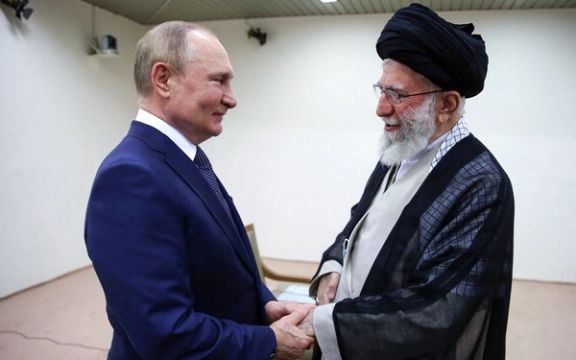
Doomed—or not?
It need not be this way.
Syria’s new, formerly jihadist leader Ahmed al-Sharaa has shown that it is possible to build productive ties with America, Europe, Turkey Arab states—and even with Russia, whose forces bombed his rebel movement just last year.
Instead of dwelling on justified grievances against Moscow, Sharaa has focused on how Syria can benefit from engagement with all sides.
It is highly doubtful that Iran’s aging Supreme Leader Ali Khamenei would ever countenance rapprochement with the United States. His worldview is too deeply rooted in the revolutionary notion of America as a permanent enemy.
But 86-year-old Khamenei cannot last indefinitely, and leadership change is coming.
However unlikely it seems now, his successor may yet recognize the advantages of setting aside old grievances to improve ties with Washington—and, in turn, to gain leverage over a Russia now wary of losing Iran to Western influence.
Whether the US would reciprocate is another matter. Donald Trump’s willingness—even eagerness—to make deals with long-time adversaries such as Russia and North Korea suggests he might be open to one with Iran as well.
There is, of course, no guarantee this will happen.
It is more likely that Khamenei’s successor will resemble him—someone who refuses “on principle” to allow rapprochement with the US, Europe, or Iran’s Arab neighbors, regardless of the economic benefits such a shift might bring to Iranians.
Meanwhile, Moscow will continue to profit from Iran’s isolation.
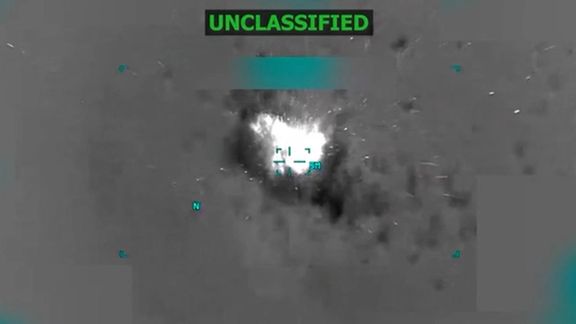
Iran’s former ambassador to Caracas said on Friday that US President Donald Trump is exaggerating the threat of drugs from Venezuela to justify an attack on the country, while ignoring the role of Washington’s traditional ally, Colombia.
Hojatollah Soltani said Washington’s efforts blaming Venezuelan drug flows to the United States are “lies and part of psychological warfare.”
The Trump administration has conducted attacks on at least six boats off the coast of Venezuela it says were carrying drugs since last month.
"Trump’s allegations about narcotics are merely a propaganda excuse to target a country whose only 'crime' is demanding the right to self-determination and maintaining independent political sovereignty," he added.
Trump told reporters at the White House on Wednesday that he had authorized CIA covert operations in Venezuela, saying of alleged drug flows from the country that “a large portion enters by sea," adding Caracas had released “thousands of prisoners and mentally ill people” into the United States as undocumented immigrants.
Soltani said the main problem lay with Venezuela's neighbor Colombia, a traditional US ally.
“The vast majority of Latin America’s drug output occurs in Colombia, a US political and military ally hosting American bases,” he told state TV via phone on Friday. “For 40 years, Washington has run the so-called ‘Colombia Plan’ to curb production, by their own admission.”
Plan Colombia, launched in 2000, supports US-Colombia efforts against cartels, insurgents and narcotics through military assistance, crop eradication and development programs.
The Trump administration decertified Colombia as a partner in the fight against illegal drugs in September for the first time in nearly 30 years over alleged failures in its drug war, the Associated Press reported.
“International statistics show that 70% of Colombian cocaine reaches the United States via the Pacific Ocean, with no links to Venezuela by sea, land or air,” Soltani added. “Of the rest, 25% uses other routes, and just 5% transits Venezuela, where the government combats drugs with UN-backed resolve.”
Iran and Venezuela are close allies and the United States has criticized the relationship between its heavily-sanctioned adversaries.
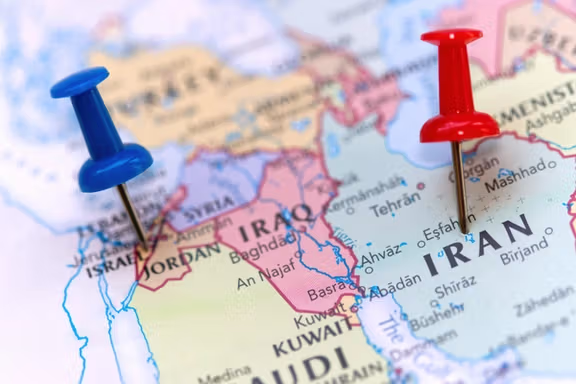
A new and far deadlier conflict between Israel and Iran looms, former Israeli intelligence official Danny Citrinowicz told Eye for Iran, warning that Tehran has learned from past clashes and is rapidly improving its missile capabilities.
Citrinowicz, a former head of the Iran branch within Israel's military intelligence, said the United States still seeks a negotiated deal with Tehran while Israel remains focused on weakening or toppling the Islamic Republic — a fundamental imbalance he warned makes escalation “almost inevitable.”
“The starting point of the next war will be the ending point of the previous one,” he said.
Now a nonresident fellow with the Atlantic Council’s Middle East program, Citrinowicz also serves as a research fellow at the Institute for National Security Studies (INSS) in Tel Aviv.
“It will be very violent from the get-go. And I really think that there won’t be a mechanism that will allow us to close it, because unlike previously when the US forced the sides to close it, now the Iranians will not be willing to close it until they feel they have balanced the equation of deterrence with Israel."
"That is why I think the next will be much more violent and longer,” he added. "It will lead to more civilian casualties."
Citrinowicz’s warning comes as President Donald Trump continues to frame the 12-day Iran–Israel war as a decisive victory. Trump has repeatedly maintained US B-2 bomber strikes "obliterated" Iran’s key nuclear sites, forcing Tehran to accept a ceasefire and halting its nuclear ambitions.
Critics, however, say the claim is largely rhetorical and that the strikes likely delayed, not ended, Iran’s nuclear advancements, leaving the conflict’s root cause unresolved.
Satellite imagery taken in recent months shows that Iran is continuing construction at the Natanz “Pickaxe” mountain or Mount Kolang Gaz-La, consistent with activity seen before the June war.
The mountain complex south of Natanz includes another older tunnel network associated with Iran’s main enrichment site, which also shows signs of ongoing work, particularly reinforcement of tunnel entrances.
'Israel didn't win anything'
After the 12-day war between Israel and Iran, many in Israel came away with the impression that Israel had won the war. Iran was hit hard, and Israeli operations left Tehran no longer viewed as a threshold nuclear state, as US and Israeli officials say. But Citrinowicz argues that this is a dangerous misconception.
“In Israel we have the wrong perception. We are saying we won — we didn’t win anything,” he said. “We had major achievements, but from the Iranian standpoint, they really believe they had major achievements too. Both sides think they won, and that’s what makes another clash inevitable.”
Citrinowicz says Israel must not underestimate Iran’s capacity to recover. He noted that Tehran has rapidly replaced assassinated commanders, resumed missile testing “almost daily,” and is seeking Russian and Chinese air defense systems to harden its skies.
“If there’s one lesson from recent history,” he said, “it’s that the regime is stronger than many believed.”
Another confrontation, he said, is likely within weeks or months as Washington’s demands — on uranium enrichment, missile limits and even some talk of joining normalization deals with Israel — meet flat Iranian refusals.
He argued that US advisers continue to misread Iran’s ideology and decision-making, while Tehran is rapidly rebuilding and testing capabilities at Natanz and Fordow, and acting bolder at sea — all of which may prod Israel into striking again.
Israel, he added, is unlikely to enjoy the same US military umbrella it had during the last war, when Washington deployed advanced interceptors and coordinated air operations. With Trump now juggling multiple crises, Citrinowicz said, “Israel could face a far tougher fight — and far less help.”
Just over a year ago, Iran launched Operation True Promise II against Israel — part of a steady escalation in which each confrontation has become more intense.
'Growing gap' between US and Israel on Iran
In his October 13 address to the Knesset, Trump declared that Iran had been “two months away” from a bomb before the US strikes in June and that he “terminated” its nuclear program afterward. “They’re not starting anything,” he said. “They just want to survive.”
Those lines, Citrinowicz cautioned, project misplaced confidence.
“Despite the fact that both sides basically want to reach an agreement, their present stances are not allowing one to be reached,” he said.
“What President Trump said in Israel actually highlights that misunderstanding — about Iran’s behavior and ideology — that will probably lead to another confrontation. Definitely, we are reaching another round of escalation.”
He added that the same misunderstanding defines the widening gap between Washington and Tel Aviv. While Trump hopes pressure will push Iran back to the table, Israel’s objective remains regime change.
“If Israel’s goal is to prevent a nuclear Iran,” he said, “an agreement, not another war, serves that purpose best.”
You can watch the full episode of Eye for Iran on YouTube or any podcast platform of your choosing like Spotify, Apple, Amazon, or Castbox.